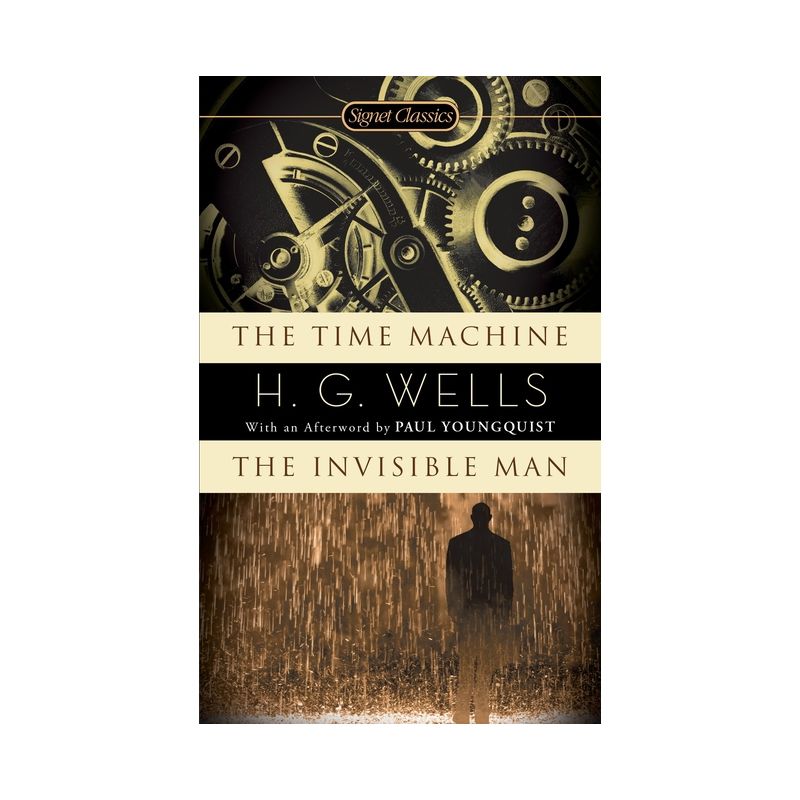Sponsored
The Time Machine/The Invisible Man - (Signet Classics) by H G Wells (Paperback)
Eligible for registries and wish lists
Sponsored
About this item
Highlights
- Together in one indispensable volume, The Time Machine and The Invisible Man are masterpieces of irony and imaginative vision from H. G. Wells, the father of science fiction.
- About the Author: Herbert George Wells (1866-1946) was born in Bromley, Kent, England.
- 320 Pages
- Fiction + Literature Genres, Classics
- Series Name: Signet Classics
Description
About the Book
Here are two masterpieces of irony and imaginative vision from the father of science fiction. "The Time Machine" propels the Time Traveller into a distant, dismal future. "The Invisible Man" tells of a brash young scientist who becomes invisible, then insane. This volume features a new Afterword. Revised reissue.Book Synopsis
Together in one indispensable volume, The Time Machine and The Invisible Man are masterpieces of irony and imaginative vision from H. G. Wells, the father of science fiction. The Time Machine conveys the Time Traveller into the distant future and an extraordinary world. There, stranded on a slowly dying Earth, he discovers two bizarre races: the effete Eloi and the subterranean Morlocks--a haunting portrayal of Darwin's evolutionary theory carried to a terrible conclusion. The Invisible Man is the fascinating tale of a brash young scientist who, experimenting on himself, becomes invisible and then criminally insane, trapped in the terror of his own creation. Convincing and unforgettably real, these two classics are consummate representations of the stories that defined science fiction--and inspired generations of readers and writers. With an Introduction by John Calvin Batchelorand an Afterword by Paul Youngquist
About the Author
Herbert George Wells (1866-1946) was born in Bromley, Kent, England. His father was a professional cricketer and sometime shopkeeper, his mother a former lady's maid. Although "Bertie" left school at fourteen to become a draper's apprentice (a life he detested), he later won a scholarship to the Normal School of Science in London, where he studied with the famous Thomas Henry Huxley. He began to sell articles and short stories regularly in 1893. In 1895, his immediately successful novel The Time Machine rescued him from a life of penury on a schoolteacher's salary. His other "scientific romances"--The Island of Dr. Moreau (1896), The Invisible Man (1897), The War of the Worlds (1898), The First Men in the Moon (1901), and The War in the Air (1908)--won him distinction as the father of science fiction. Henry James saw in Wells the most gifted writer of the age, but Wells, having coined the phrase "the war that will end war" to describe World War I, became increasingly disillusioned and focused his attention on educating mankind with his bestselling Outline of History (1920) and his later utopian works. Wells witnessed a world more terrible than any of his imaginative visions, and he bitterly observed: "Reality has taken a leaf from my book and set itself to supercede me." John Calvin Batchelor is the acclaimed author of such imaginative novels as The American Falls, People's Republic of Antarctica, and Gordon Liddy Is My Muse. Paul Youngquist is professor of English and associate chair of Graduate Studies at the University of Colorado Boulder. He's the author of three books: Race, Romanticism, and The Atlantic; Madness and Blake's Myth (1991); and Monstrosities: Bodies and British Romanticism (2003), as well as numerous articles on a variety of subjects.Additional product information and recommendations
Sponsored
Discover more options
Loading, please wait...
Your views
Loading, please wait...
Guests also viewed
Loading, please wait...
Featured products
Loading, please wait...

